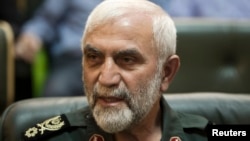A senior Iranian Revolutionary Guards commander was killed in Syria, Tehran said Friday, as French warplanes carried out fresh airstrikes in the country.
General Hossein Hamedani was killed by Islamic State fighters earlier this week while advising Syrian troops in the northern region of Aleppo, according to a statement released by the Guards, an elite branch of Iran's military.
Shi'ite Iran is a key regional ally of Syria. It has provided military and political support for beleaguered President Bashar al-Assad during his four-year-long fight against a wide range of Sunni rebel groups seeking to overthrow him.
While Syrian government forces, backed by personnel from Iran and Lebanon's Hezbollah Shi'ite militia and Russian airstrikes, have launched an offensive against rebels in central Syria, the Syrian Observatory for Human Rights reported Friday that the Islamic State militants seized villages from rebel groups outside the northwestern city of Aleppo.
The Britain-based rights group said it was the Islamic State's biggest advance since August.
Intel source
A U.S. intelligence official speaking on the condition of anonymity said, "While Hamedani’s death will do little to curb Tehran’s support to Assad, there’s no doubt that it is a psychological blow to pro-regime forces in Syria.
"Iran’s support to the Assad regime has a cost. Though it appears that Tehran is committed to doubling down on supporting the Syrian regime, its expanding role in the conflict will put more Iranian lives at risk to support a failed dictator. Something Russia should keep in mind, too."
French strikes
On Friday, France announced it carried out its second round of airstrikes in just two weeks against Islamic State targets in Syria.
"French Rafale jets dropped bombs on a training camp" in the Islamic State stronghold of Raqqa, French Defense Minister Jean-Yves Le Drian told Europe 1 radio. "The objectives were accomplished," he added, providing no details on casualties.
France is part of a broad, U.S.-led coalition trying to defeat the Islamic State group and has provided weapons and other support for its preferred Syrian rebel groups
Russia not targeting IS
Russia is Assad's main international ally, and in recent days has dramatically stepped up its military intervention in support of Damascus.
Russian news agencies on Friday quoted the deputy head of the Russian General Staff, Lieutenant General Igor Makushev, as saying Russian jets struck 60 "terrorist targets" over the past 24 hours. He also said that a direct hit by "precision-guided bombs" on the headquarters of the Liwa al-Haqq insurgent group had killed around 200 militants and "two high-ranking Islamic State field commanders."
Liwa al-Haqq is an Islamist insurgent group based in Syria's Homs region and part of a rebel coalition that does not include the IS.
French Defense Minister Drian said Friday that "80 to 90 percent" of Moscow's recent airstrikes have not targeted the Islamic State group.
Other Western officials have complained the Russian airstrikes are aimed primarily at other Syrian rebel groups, including many of those backed by the United States and its allies.
U.S. Defense Secretary Ash Carter told reporters in London on Friday that Russia's actions in Syria "carry risks both to the region and to Russia itself" and will "only inflame the Syrian civil war." Moscow's strategy in Syria is "fundamentally flawed," he said.
Russian missiles hit Iran
There are also concerns about the accuracy of the weapons Russia is using to target Syrian rebels.
U.S. officials on Thursday told VOA that four Russian cruise missiles launched from warships in the Caspian Sea crashed in Iran, falling short of their targets in Syria. The official said there has been no information on damage.
Russian officials said 26 cruise missiles were launched at 11 Islamic State targets, which officials said were destroyed without causing any civilian casualties. The officials said no missiles went awry.
The New York-based group Physicians for Human Rights said earlier this week that Russian airstrikes had "damaged three medical facilities in Syria in two days, exacerbating an already dire situation for civilians living in areas where the health system has been systematically attacked by the Syrian government."
VOA National Security Correspondent Jeff Seldin contributed to this report.





